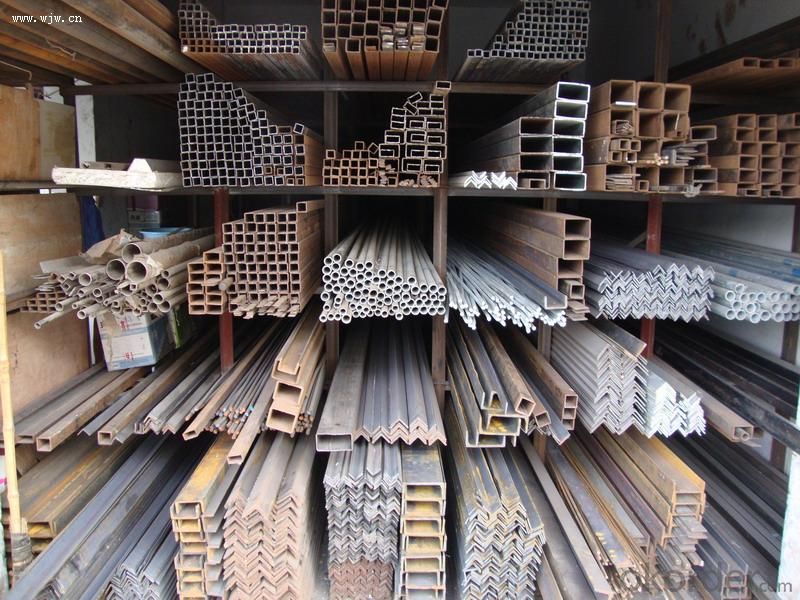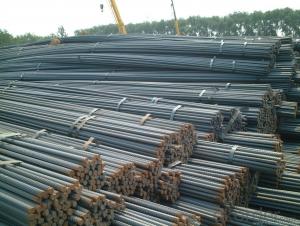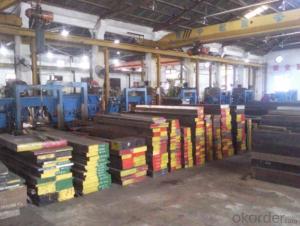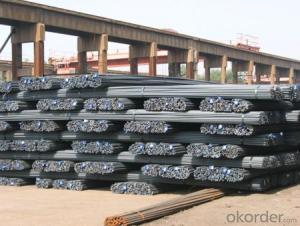Steels Manufacture Building Material Construction Made in China China on Hot Sale
- Loading Port:
- Tianjin
- Payment Terms:
- TT OR LC
- Min Order Qty:
- 100 m.t
- Supply Capability:
- 1000 m.t/month
OKorder Service Pledge
OKorder Financial Service
You Might Also Like
1.Packaging & Delivery
Packaging Detail: | in bundles or as customer's requirement |
Delivery Detail: | Within 30days after receiving your deposit or copy of L/C |
2.Specifications
HRB400,HRB500 Steel Rebars
1.China direct supplier
2.Best service
3.Competitive price
4.Quantity assured
3.Product Description
Name | High Tensile Export Reinforcing Steel Bar ,Deformed Steel Bar ,HRB400B,HRB,46B,HRB500 Building Construction Material |
Standard | ASTM A615 /BS BS 4449 /GB HRB/ JIS G3112 |
Grade | A615 Gr40/60/75 BS 4449 Gr460,B500 GB HRB335,HRB400 ,HRB500
JIS G3112 SD390
|
Diameter | 6mm-40mm |
Length | 6-12m |
Technique | Low temperature hot-rolling reinforcing deformed steel rebar |
Tolerance | As the standard or as your requirement |
Application | Building, construction, road, bridge,etc |
Certificated | BV |
MOQ | 500tons per size steel rebar |
Packing details | Steel rebar packed in bundle or as your requirement |
Delivery | Within 30 days after deposit |
Payment | T/T or L/C |
4.Chemical Composition
Grade | Technical data of the original chemical composition (%) | |||||||
C | Mn | Si | S | P | V | |||
HRB400 | ≤0.25 | ≤1.60 | ≤0.80 | ≤0.045 | ≤0.045 | 0.04-0.12 | ||
Physics capability | ||||||||
Yield Strength(N/cm2) | Tensile Strength(N/cm2) | Elongation (%)
| ||||||
≥400 | ≥470 | ≥14 | ||||||
Grade | Technical data of the original chemical composition (%) | |||||||
C | Mn | Si | S | P | V | |||
HRB500 | ≤0.25 | ≤1.60 | ≤0.80 | ≤0.045 | ≤0.045 | 0.04-0.12 | ||
Physics capability | ||||||||
≥500 | ≥630 | ≥12 | ||||||
5. Theorectical weight
Diameter (MM) | Cross Sectional Area (MM2) | Theorectical Weight (KG/M) | Weight of 12M Bar (KG) | A Ton Contains 12M Bars (PCS) |
6 | 28.27 | 0.222 | 2.664 | 375.38 |
8 | 50.27 | 0.395 | 4.74 | 210.97 |
10 | 78.54 | 0.617 | 7.404 | 135.06 |
12 | 113.1 | 0.888 | 10.656 | 93.84 |
14 | 153.9 | 1.21 | 14.52 | 68.87 |
16 | 201.1 | 1.58 | 18.96 | 52.74 |
18 | 254.5 | 2 | 24 | 41.67 |
20 | 314.2 | 2.47 | 29.64 | 33.74 |
22 | 380.1 | 2.98 | 35.76 | 27.96 |
25 | 490.9 | 3.85 | 46.2 | 21.65 |
28 | 615.8 | 4.83 | 57.96 | 17.25 |
32 | 804.2 | 6.31 | 75.72 | 13.21 |
36 | 1018 | 7.99 | 98.88 | 10.43 |
40 | 1257 | 9.87 | 118.44 | 8.44 |


- Q:How do steel pipes handle seismic activities?
- Steel pipes are highly durable and resistant to seismic activities. Their strong and flexible nature allows them to withstand the ground shaking during earthquakes without compromising their structural integrity. Steel pipes are designed to absorb and distribute the energy generated by seismic waves, minimizing the potential damage caused by earthquakes. Additionally, their high strength-to-weight ratio makes them ideal for withstanding the lateral forces and ground movements associated with seismic activities.
- Q:What is the role of steel pipes in the transportation of water?
- Steel pipes are of utmost importance in the transportation of water due to their durability and strength. They find extensive use in diverse water supply systems, including municipal water distribution networks, irrigation systems, and industrial water transportation. One of the primary benefits of steel pipes lies in their capacity to endure high pressure and deliver water reliably over long distances. The strength of steel enables the construction of pipelines with larger diameters, facilitating the efficient movement of substantial water volumes. Additionally, steel pipes exhibit remarkable resistance to corrosion, a critical characteristic when conveying water that may contain different minerals, chemicals, or contaminants. The corrosion-resistant properties of steel pipes ensure that the water quality remains uncompromised throughout the transportation process. Furthermore, steel pipes offer exceptional structural integrity, rendering them suitable for both underground and above-ground installations. They can withstand extreme weather conditions, seismic activity, and heavy loads, thereby ensuring the longevity and dependability of the water transportation system. Moreover, steel pipes are easy to install and maintain, apart from being robust and durable. They can be seamlessly welded together, resulting in a pipeline with minimal leakage points. Regular inspections and maintenance help identify potential issues or damages, guaranteeing an uninterrupted flow of water. In conclusion, steel pipes play a critical role in water transportation, serving as a strong and reliable conduit. Their ability to withstand high pressure, resist corrosion, and maintain water quality make them an ideal choice for various water supply systems, contributing to the efficient and sustainable distribution of water resources.
- Q:How are steel pipes used in wastewater treatment plants?
- Steel pipes are commonly used in wastewater treatment plants for various purposes such as conveying wastewater, transporting chemicals, and managing water flow. They are used to transport wastewater from different treatment stages, ensuring efficient movement within the plant. Additionally, steel pipes are used to transport chemicals, such as disinfectants or coagulants, which are necessary for treating the wastewater. They also play a crucial role in managing water flow, helping to control the movement and distribution of wastewater throughout the treatment process. Overall, steel pipes are essential components in wastewater treatment plants, facilitating the movement and treatment of wastewater efficiently.
- Q:The difference between carbon and welded steel tubes
- Seamless steel pipe is made of Steel No. 10-20. It is of high quality carbon structural steelWelded steel pipe is usually welded by Q235 steel plate
- Q:Are steel pipes suitable for offshore drilling platforms?
- Steel pipes have been widely used in offshore drilling platforms because of their strength, durability, and resistance to corrosion. These platforms operate in harsh marine environments, where they are exposed to saltwater, extreme pressure, and temperature changes. Steel pipes are capable of enduring these conditions and serving as a reliable and long-lasting solution for transporting fluids, such as oil and gas, from the seabed to the surface. Moreover, the ability to weld steel pipes together facilitates their easy installation and maintenance on offshore drilling platforms. In conclusion, steel pipes have proven to be an appropriate choice for offshore drilling platforms due to their robustness and ability to withstand the challenging conditions of the marine environment.
- Q:Can steel pipes be used for underground cable ducting?
- Underground cable ducting can utilize steel pipes, as they possess durability and strength. Due to their robustness, steel pipes commonly serve as a protective casing for cables, warding off potential harm from external factors like moisture, pressure, and environmental elements. Moreover, steel pipes exhibit resistance to corrosion, rendering them suitable for extended underground use. In addition, their ability to withstand heavy loads deems them ideal for areas where cables may face high pressure or weight. Nevertheless, before selecting steel pipes for underground cable ducting, it is vital to take into account soil conditions, installation requirements, and the specific needs of the cable system.
- Q:Can steel pipes be used for underground fire sprinkler systems?
- Yes, steel pipes can be used for underground fire sprinkler systems. Steel pipes are commonly used for their strength and durability, making them suitable for underground installations. However, it is important to ensure that the steel pipes are properly coated or protected against corrosion to maintain their integrity over time.
- Q:What is the tensile strength of steel pipes?
- The grade and type of steel used can cause variation in the tensile strength of steel pipes. However, steel pipes generally possess a high tensile strength. Carbon steel pipes typically have a tensile strength range from 370 to 700 MPa, while alloy steel pipes can have a tensile strength range from 770 to 1200 MPa. These impressive tensile strengths enable steel pipes to withstand substantial pressure and stress, making them suitable for diverse applications in industries like construction, oil and gas, and automotive. It is important to recognize that factors like the manufacturing process, heat treatment, and the presence of defects or imperfections can also impact the tensile strength of steel pipes. Hence, it is recommended to consult the manufacturer's specifications or industry standards to determine the precise tensile strength of a specific steel pipe.
- Q:How are steel pipes used in the construction of gas distribution networks?
- Steel pipes are commonly used in the construction of gas distribution networks due to their durability, strength, and resistance to corrosion. These pipes are installed underground to transport natural gas from the source to various distribution points. They are used to create a reliable and efficient network that delivers gas safely to homes, businesses, and industries.
- Q:Can seamless steel pipe and ordinary steel pipe be welded?
- If your project is a seamless steel pipe, so theoretically, you put the tube with connected is not used.But the actual engineering operation, design drawings will be put on the normal need to improve the requirements of the drawings to the actual requirements, so if is the need of seamless steel pipe, welded pipe in the end so can you see yourself.
1. Manufacturer Overview |
|
|---|---|
| Location | |
| Year Established | |
| Annual Output Value | |
| Main Markets | |
| Company Certifications | |
2. Manufacturer Certificates |
|
|---|---|
| a) Certification Name | |
| Range | |
| Reference | |
| Validity Period | |
3. Manufacturer Capability |
|
|---|---|
| a)Trade Capacity | |
| Nearest Port | |
| Export Percentage | |
| No.of Employees in Trade Department | |
| Language Spoken: | |
| b)Factory Information | |
| Factory Size: | |
| No. of Production Lines | |
| Contract Manufacturing | |
| Product Price Range | |
Send your message to us
Steels Manufacture Building Material Construction Made in China China on Hot Sale
- Loading Port:
- Tianjin
- Payment Terms:
- TT OR LC
- Min Order Qty:
- 100 m.t
- Supply Capability:
- 1000 m.t/month
OKorder Service Pledge
OKorder Financial Service
Similar products
New products
Hot products
Related keywords































